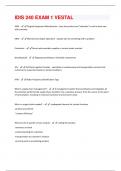Examen
CTEL 1: Additive-Language Development || with Accurate Answers 100%.
- Cours
- Établissement
Behaviorist Theory of First-Language Acquisition correct answers Proposes that humans learn language through a process of reinforcement. In response to a stimulus, children offer a spoken response, usually a repetition of something they've just heard. Then they receive feedback which creates ope...
[Montrer plus]












